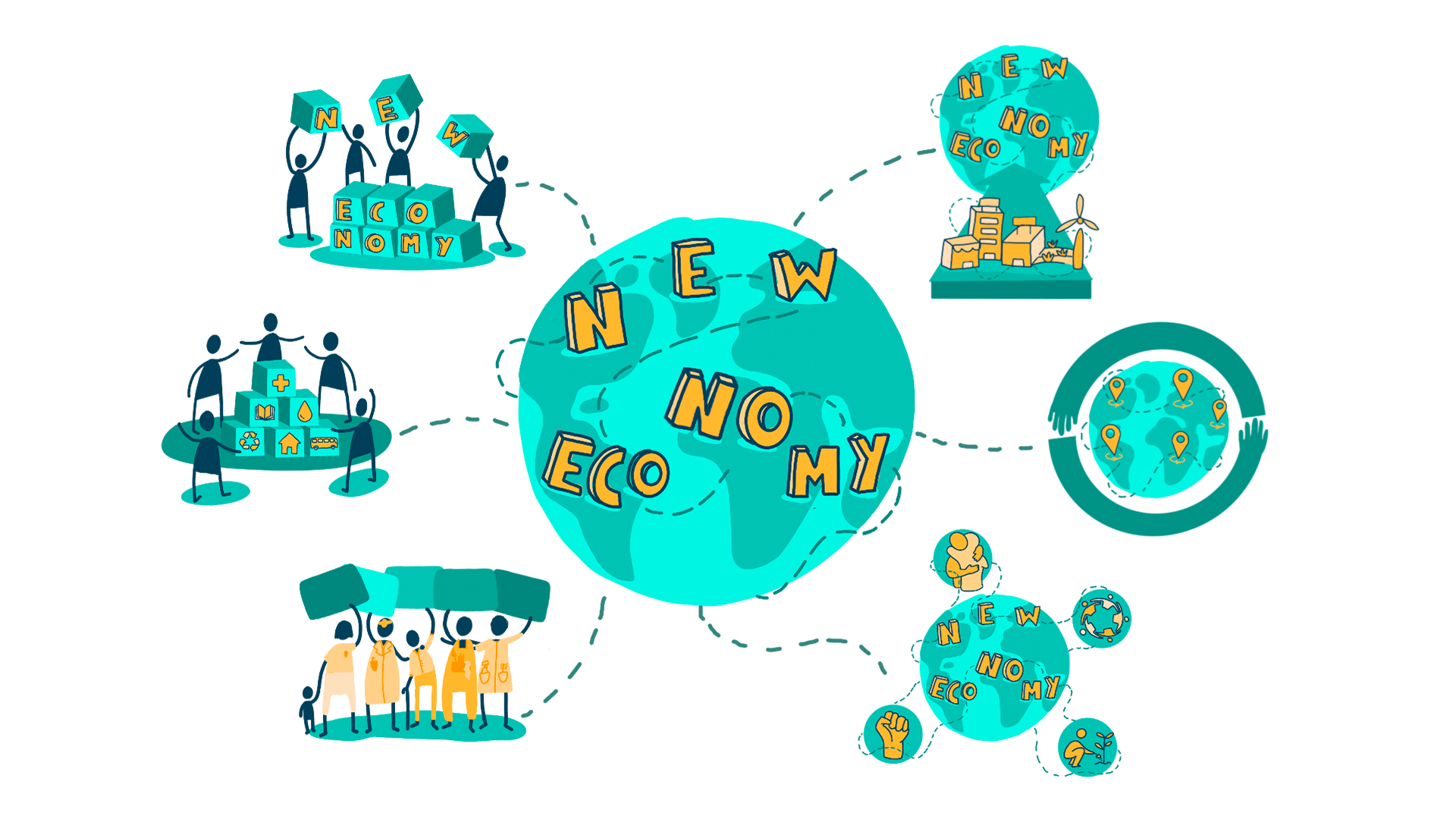
The economy is designed, and we can redesign it! – transformational ideas for a life-sustaining economy within Earth’s limits
With our European network in 32 countries, Friends of the Earth Europe has developed 7 transformational ideas for a new economy for Europe. We hope it will inspire action to wholly transform the current dominant growth-based, capitalist, neoliberal economy, which is at the root of the destruction of our shared planet and of people, and to dismantle the power structures maintaining and driving it.
We hope it will galvanise collective action to redesign an economy that serves the wellbeing of all people and our shared planet.
Download the PDF or read the paper below.
7 Sparks to Light a New Economy is also available in French, German and Spanish
Introduction
The economy is designed, and we can redesign it! With our European network in 32 countries, Friends of the Earth Europe has developed 7 transformational ideas for a new economy for Europe. It is a taster of some of our topline visions and priorities. We hope it will inspire action to wholly transform the current dominant growth-based, capitalist, neoliberal economy, which is at the root of the destruction of our shared planet and of people, and to dismantle the power structures maintaining and driving it. We hope it will galvanise collective action to redesign an economy that serves the wellbeing of all people and our shared planet. Each idea put forward is not transformational on its own – they are interdependent. Transformational change to our economic system comes from implementing these ideas, and beyond, together.
Our vision is for the European level, and is written from a European perspective. Whilst many of the ideas can be applied globally, we seek to learn from allies in the Global South in order to integrate a genuine Global South equity perspective in future.
What is ‘the economy’? At its most basic stripped back form, ‘the economy’ is the set of production and consumption activities that go into transforming resources from Nature, into goods and services. These range from tap water to electricity, roads to unemployment benefits, haircuts to food.
The damaging view that the economy is separate from Nature and people: there is nothing inherently wrong with the basic function of the economy described above, it is what it has become in practice, politics and culture that is problematic and is causing environmental and social destruction. The economy is seen as a distinct sphere from society and Nature, neglecting the fact that the economy is embedded in Nature, and thus dependent upon our shared planet for providing resources and absorbing pollutants, and that the economy both relies on and serves or impacts all people.
The rise of neoliberalism: neoliberalism began accelerating in importance in the late 1940s, led mainly by European male, white, liberal and capitalist economists and intellectuals, united in their belief that individual freedom was under threat from collectivist trends. They pushed their ideas, and from the 1970s, gradually international organisations and governments took the neoliberal turn. Now, the dominant European, and global, economic ideology and practice is the neoliberal market economy.
Neoliberalism – a fervently pro-capitalist economic ideology: neoliberalism involves political, economic and social arrangements that emphasise market relations and individual responsibility, the privatisation of the public sphere, a lack of meaningful democratic participation, deregulation of the corporate sector, lowering of income and corporate taxes, and cuts to public spending. It promotes profit, accumulation and ‘efficiency’ above all else on the flawed basis that these create benefits that ‘trickle down’ to everyone. It works on the basis of inequality and therefore creates and reproduces oppression (including patriarchy, racism, class, neocolonialism, heteronormativity) by those who hold economic power. It aims to commodify and monetise as much as possible, including Nature, relationships between people and between people and their territories, and women’s work and bodies.
Economic growth at the core of the neoliberal, capitalist system: the seeking of a constant expansion and intensification of the economic sphere. This is evident in that the main indicator to measure the EU and European states’ ‘health’ is the short-sighted and reductive Gross Domestic Product (GDP). Economic growth has also become the mental infrastructure of industrial societies – the growth ethic translates into a constant desire for improvement: ‘growth is progress’.
Exploitation of resources, peoples and Nature: with European economies’ obsession for more – more profit, more extraction, more production, more consumption, and thus more excretion – comes a sheer unsustainable scale of resource extraction, assaulting Nature and pushing us past planetary boundaries. European economies were built in great part through the colonisation of the Global South, extracting and depleting resources and appropriating human bodies and labour. This exploitative and unjust situation still exists today through neocolonialism.
The dominant economic system is failing most people and the planet, BUT the economy is designed, and we can redesign it! We must wholly transform the current economic system, dismantle the power structures maintaining and driving it, and we must act collectively to redesign an economy serving all people and our shared planet – one whose purpose is both to:
- Satisfy basic needs: and ensure a decent and dignified life for all. Basic human needs are few, finite, and classifiable, even if economics constantly tries to mix them up with wants which are infinite and insatiable. Needs include physical – nutrition, health, shelter – and non-physical ones – subsistence, protection, affection, understanding, participation, idleness, creation, identity, freedom;
- Stay within ecological limits: we urgently need absolute reductions, and far greater global equity, in the use of natural resources, with the greatest reductions coming from the world’s richest consumers, including Europe.
Ideologically divest from the idea that bigger and faster is always better: to challenge the supposed inevitability and desirability of economic growth and growth in material and even non-material wealth. Basic goods and services should no longer be commodities, but rights, accessible to all outside of the market domain.
European economy must degrow overall: the total volume and pace of the European economy must get smaller and slower. Within this ‘envelope’ of course, things are not static. Degrowth means shrinking sectors of economic activity that are ecologically destructive and offer little or any social benefit, such as the military sector, aerospace, fast fashion or single-use packaging. However, we want to maintain or grow sectors that satisfy the basic needs and wellbeing of all, such as the renovation of buildings, renewable energies, reusable packaging, cycling infrastructure, participatory activities like community theatrical productions, agro-ecological food networks.
Idea 1: An economy within Earth’s limits
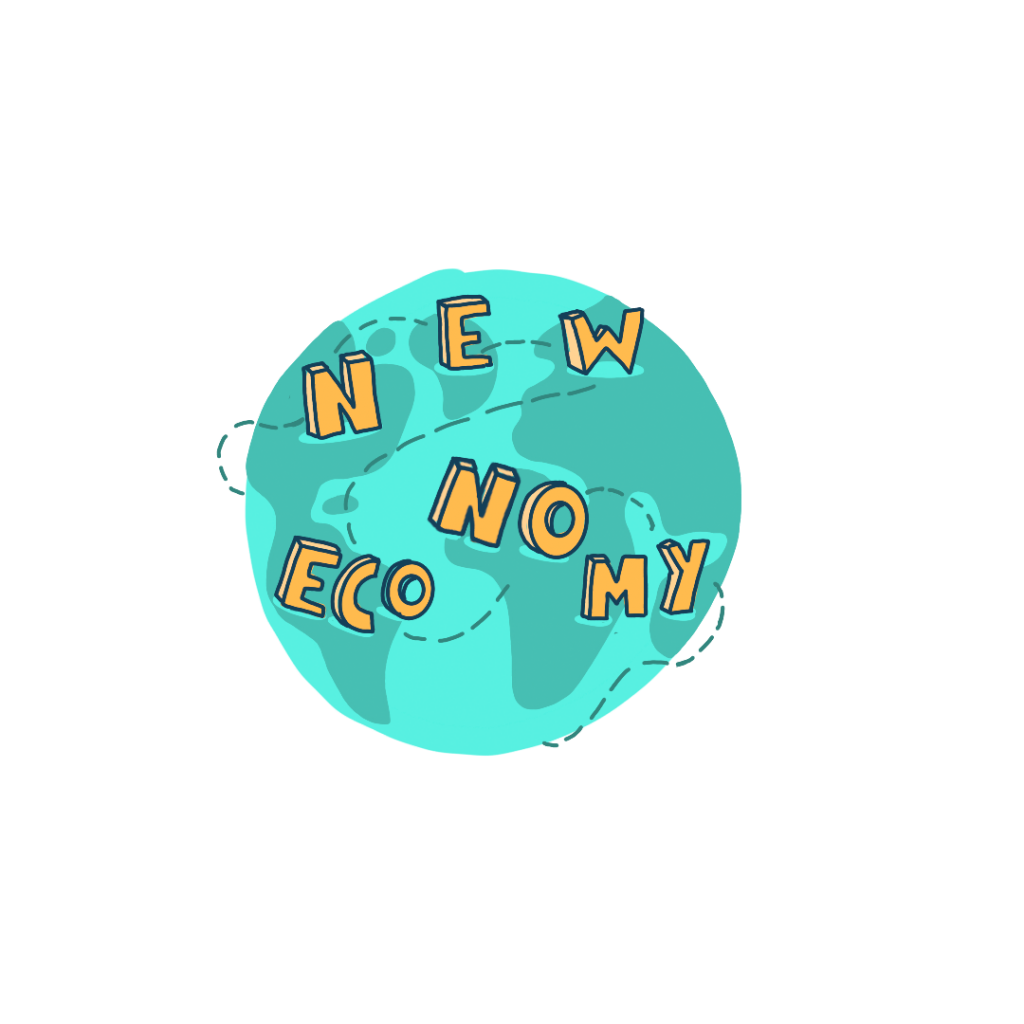
Our vision is of a life-sustaining economy within planetary boundaries – an end to Europe’s over-exploitation of resources beyond the Earth’s capacity to regenerate. An altogether different way of producing, consuming and relating to Nature.
Within limits: Europe is responsible for a disproportionate part of the depletion of common global natural resources, and for extensive environmental and social harms. We need to reduce absolute consumption – the production and consumption of goods and services must be: within the stocks of non-renewable resources, within the regenerative capacities of ‘renewable’ natural resources, and within the assimilative capacities of natural sinks.
A post-extractivist equitable future: this demands a full transformation to a truly sufficient, equitable and circular economy. The use of resources must benefit all equally. Tweaks to the current system, green technology innovations, a reliance on decoupling or digitalisation will not work.
Bringing it back to local: local provisioning accessible to all should become the new logic around which the economy is structured. Basic requirements of life should be locally produced and supplied, as much as possible. This means re-building industries and agricultural capacities that were outsourced, and re-starting to produce in a totally different way, with territories’ production less specialised and more diversified.
Limiting social and environmental impacts: any transformation of natural resources into goods and services, and dealing with their end of life, has some impact on our shared planet, on people and other species. However, the most sustainable and least impactful ways to extract, produce, process, design, manufacture, transport, recycle and more, must become the norm. This means working with Nature instead of against it, and strong and binding laws across the full value chain and ensuring those responsible (companies, governments) are held accountable if the laws are not met or harms are caused. Resource sovereignty: communities who are most directly impacted by resource extraction and who are knowledgeable about local ecosystems should be empowered to be key decision makers.
Idea 2: A truly democratic and participative economy
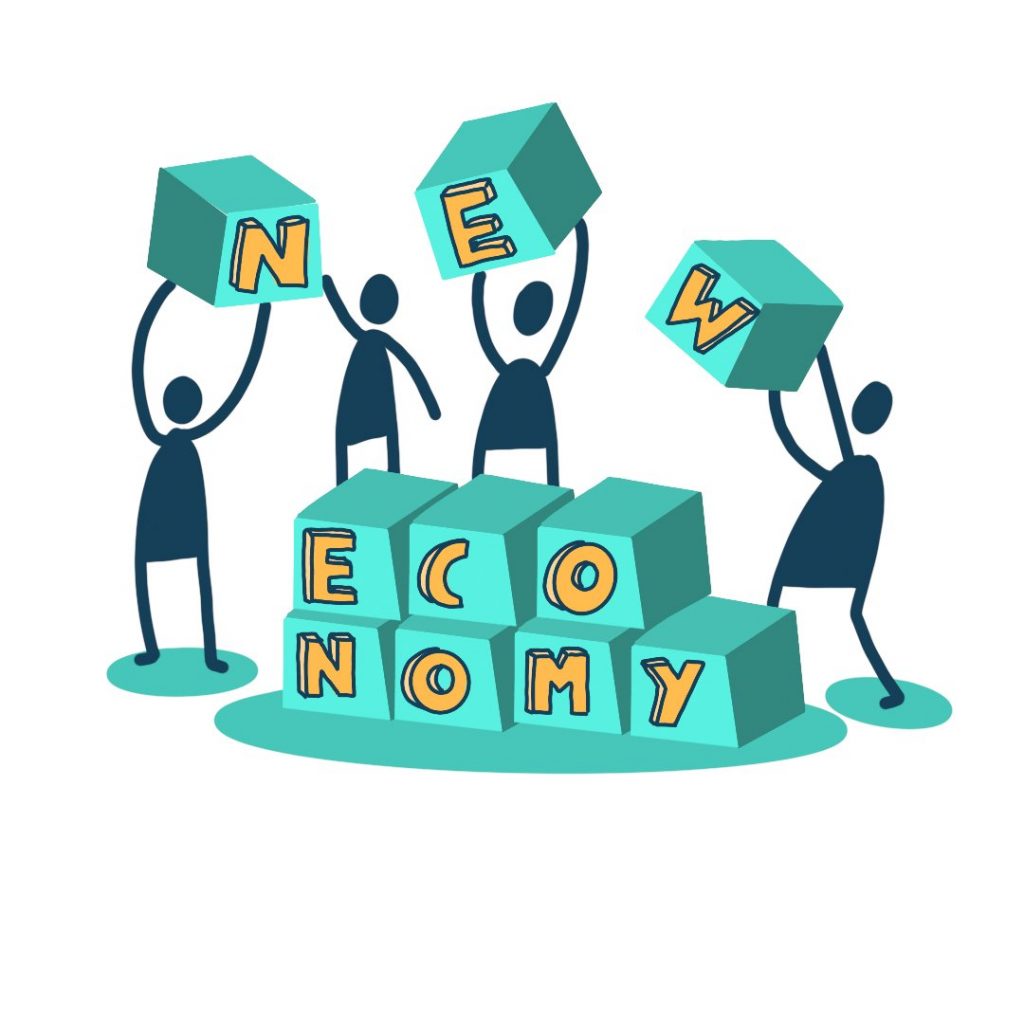
A new economy is not only a question of remaining within Earth’s limits, of producing and consuming less, it is a broader and more ambitious project of re-placing the economic sphere under public scrutiny and ensuring all citizens have power in decision-making in a just and equitable way.
Re-politicising economics, de-economising politics: we need to re-politicise economics, that is turning the economy into a means of achieving democratically defined ends rather than being an end in itself. Reciprocally, we need to de-economise politics, that our definition of ‘a good life for all’ stems from a democratic compromise between the different visions shared across the community, and is not embodied by abstract quantitative indicators such as Gross Domestic Product (GDP). The scope of ‘acceptable’ political ideas needs to diversify beyond the current broad acceptance that there is no alternative to the growth-based, capitalist, market-led neoliberal economy. Voices beyond the political elite, corporations and mainstream media must be listened to.
Democratic institutions fit for a new economy: we need hugely increased, bottom-up people’s participation, organised around the principles of justice and equity, where all citizens have an effective chance to participate in all the fields of political life, and barriers to this are tackled, such as time, resources, language, ability and confidence in public speaking, ability to read etc.; traditional knowledge and the experiences of the most affected sectors of societies should be central to solutions and decision-making; direct and participative democracy, with much more frequent, regular and concrete consultation of citizens, different forms of representation; and localisation and subsidiarity, where policies are decided at the most appropriate and decentralised level, which in many more cases will be at a lower level, municipal or regional.
Deeper, stronger democracy – how?: a direct and participatory democracy could take different forms at the different levels of decision, from local to global. Some examples are:
- district councils
- workers’ assemblies
- municipal and popular assemblies
- participatory budgeting
- citizens conventions
- citizens-initiated referendums or laws
Overhauling representative democracy: including banning the funding of political parties from the corporate sector, regulating lobbying so policy is conducted entirely in the public interest and democratic institutions and decision-making are protected from corporate interference, measures to guarantee the independence and pluralism of the media.
| Big business, in particular the fossil fuel industry, has a huge influence on current decision-making processes at all levels of government. During COP26 in Glasgow in 2021, fossil fuel companies flooded the venue with more lobbyists than any single country delegation by far, and outnumbered the official indigenous constituency two to one. Any hope of a truly democratic system starts with curbing undue influence and vested interests from polluting our politics. |
Idea 3: A public future
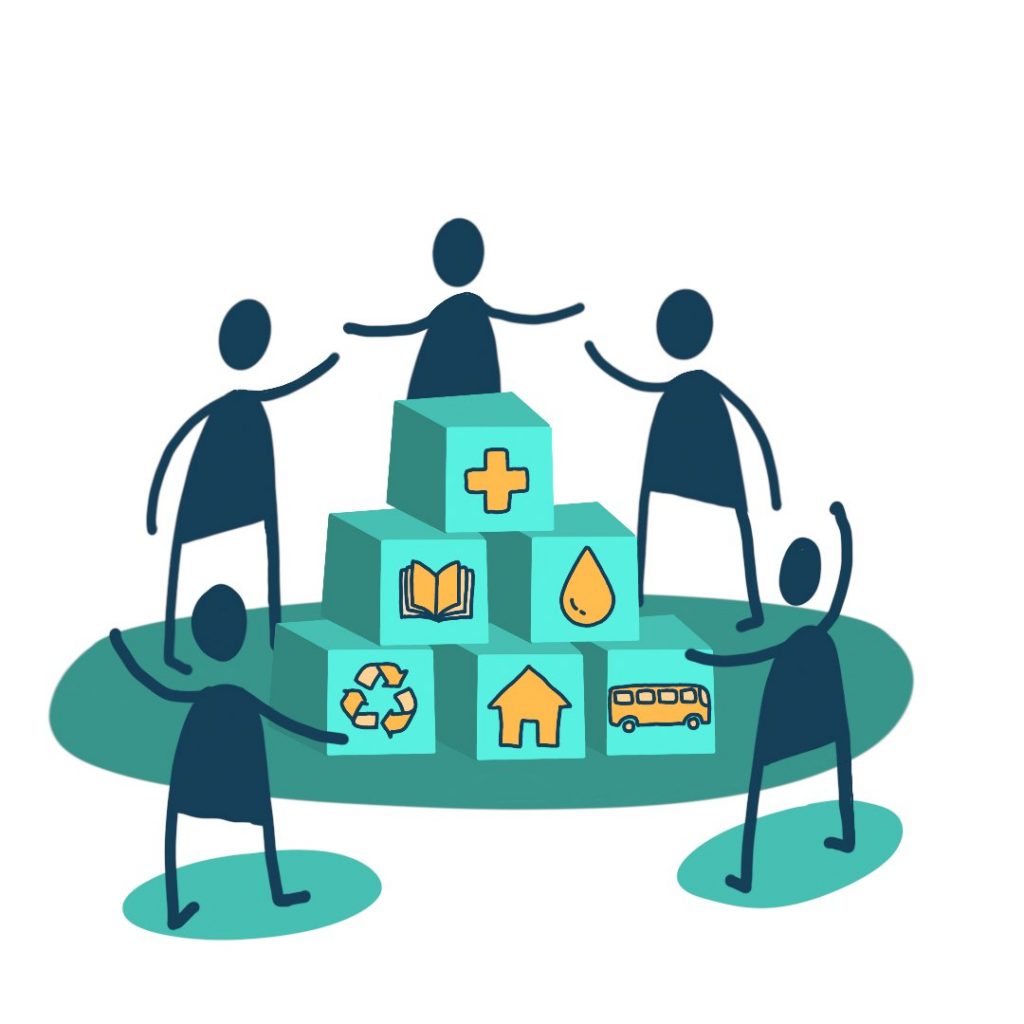
Our vision is an economy that meets the basic needs of everyone, through publicly- and common-owned and managed services and infrastructure, and without growth and profit motives.
A ‘public future’: new privatisation in all its forms, as well as the commodification of Nature, must end and the sphere of private ownership must shrink, re-placing services in public hands. Public or common ownership can deliver equivalent or better services than privatised ones, cost, quality and accessibility-wise, without sacrificing the social mission. Publicly-led and owned solutions can lead the way in solving our ecological crisis, whereas market-based and private solutions fail to do this.
Universal Basic Services (UBS): the free public provision of infrastructures and services in areas such as water, waste, education, healthcare, housing and transport are the most effective way to ensure basic needs are met and human rights are enforced. They are also a powerful tool for wealth redistribution, and inequality and poverty reduction. Low income, marginalised people and women would benefit in particular.
Renationalisation and remunicipalisation: this is gaining traction in Europe, where a state or local public authority reclaims the ownership, operation, management and provision of a public service that had been privatised. It enables recovery of control over the local economy and resources, part and parcel of carrying out planning for a just ecological transition.
Collective management and the commons: state ownership is not the limit, public means the commons too – we need to restore and develop forms of ownership that are neither public nor private, to manage vital resources and organise provision. ‘Commons’ refers to the design of an organisation or property in which, usually self-managed, collectives share resources or means of production (land, tools, knowledge) in order to satisfy basic needs in a cooperative and democratic way, accessible to all members. Reclaiming ownership is possible in almost every domain: throughout Europe, citizens and workers already self-organise through organic food cooperatives, community gardens, housing cooperatives, mutually-owned children’s nurseries, etc.
| Community-owned renewables: cities, citizens, communities and cooperatives are at the vanguard of Europe’s energy transition, and are already benefiting from running their own energy resources all over Europe. Putting people at the heart of renewable schemes is the best way to bring about the fossil-free transition we need. |
Money and economic democracy – two sides of the same coin: private banks have significant power – they control the creation of money and through the loans they provide to individuals and enterprises, they determine which projects can be financed and developed. Having a short-term approach, they tend to give loans to the most profitable and less sustainable projects. In a new economy, money can be managed as a public, sovereign or commons resource, instead of being issued as debt and with interest. This would entail democratically-managed and democratically-controlled institutions having the power of monetary creation and funding allocation, without interest, to projects that foster sustainability and wellbeing. In complement, community-owned local currencies have a huge untapped potential to help build resilient and (re)localised economies.
Not a panacea: public and commons ownership is only one of the aspects of the needed transformation: it is not enough that utilities, resources and services are publicly-owned, but they should also be publicly or commonly managed, involve a high degree of democratic control and participation, and exclude the growth and profit motives.
Idea 4: Rethinking work
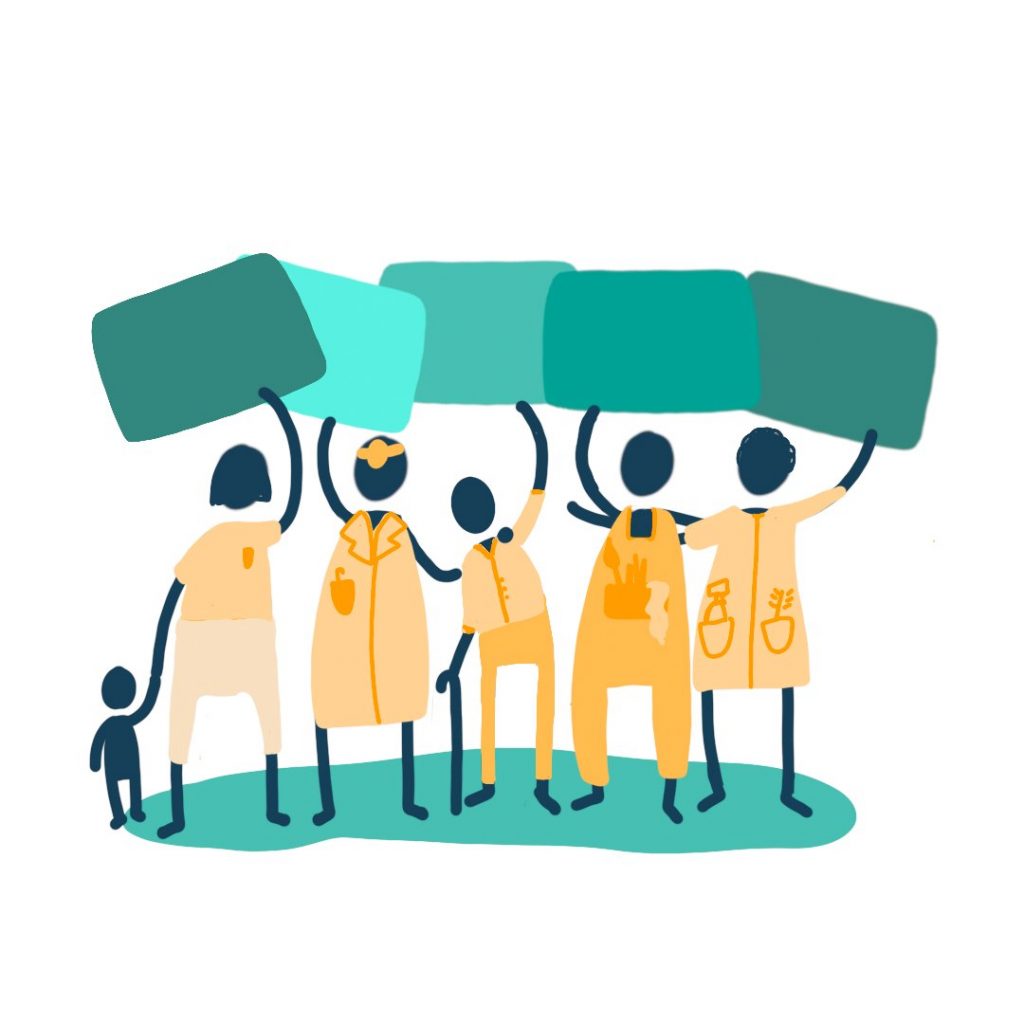
Rethinking work – its centrality in society, the definitions, scope, and value of different types of work – in a new economy gives the potential to imagine a society liberated from, and emancipated in, wage work.
Work as a moral value, a social imperative: whilst work for many is a great source of wellbeing, work in our capitalist and growthist economies also leaves millions of people behind and creates much individual and collective ill-being. Capitalism, with its end goal being greater profit extraction, is structurally organised around an under-use (unemployed people), a mis-use (poorly allocated workforce) and over-use (long hours, high pressure jobs) of human work. Gains from productivity increases have flowed to capital (more profit, material consumption), not labour (in the form of increased leisure).
A society liberated from wage work
A broader definition and value of ‘work’: we need to widen the definitions, recognise the value, promote and equally share a greater diversity of types of works (many which are performed by women) – reproductive work, care and domestic work, intellectual work, immaterial work, etc., as well as workplaces – work is performed in households, communities, cooperatives, associations, small-scale subsistence agriculture. Many of these types of work are essential and do not need nor entail accumulation, commodification, endless consumption and production.
Reduced work time and work sharing: we need to question the centrality of wage work in our societies. Reduced working time (within a wider bundle of reforms and ensuring adequate and sufficient salaries) can allow for maintaining or increasing the number of jobs in an economy that does not grow. Productivity gains can be re-channelled into time for leisure, democracy, care and domestic activities and community activities instead of profit accumulation and can reduce our environmental footprint.
| Friends of the Earth Ireland are part of a campaign for a four day working week. Partnering with trade unions, women’s rights and civil society organisations, academics and more, they are advocating to move towards the four day week being the standard work arrangement across the economy, with no loss of pay. |
Flexible working time: more flexible conditions – where the employer and employee can agree on cases where the employee can independently schedule and determine the location and/or working time/amount. It can help people strike a healthier balance between work and private lives. Conditions should ideally be negotiated with social partners (trade unions), be legally regulated and with a strong monitoring and implementation framework.
De-linking economic growth, employment and social protection: we need ways to reduce the pressure for constant economic growth and that may mean reducing the prominence of the wage labour market in providing social welfare and guaranteeing income. Two relevant, promising proposals, if designed and implemented in a sound way, are:
- Universal Basic Income (UBI): the transfer of a sum of cash money to all individuals, on a regular basis, during their whole lifetime, and without any condition or requirement. The most regressive proposals see in a UBI a way to dismantle public services and social security nets, and would perfectly fit into capitalist and growthist economies. Progressive proposals, to the contrary, are definitely worth examining: they aim at both individual and collective emancipation and self-fulfilment, and would come in complement to a strengthening of existing rights and social security nets.
- Job guarantee: governments take up the role of ‘employer of last resort’ by providing the funds necessary to offer a uniform wage and benefit package to anyone willing and able to work. This could liberate workers from the private-sector ‘race to the bottom’ and offer meaningful and well-paid jobs towards ecologically sustainable ends.
A society emancipated in wage work
Decent work: that respects the fundamental rights of the human person as well as the rights of workers in terms of conditions of work safety and remuneration. It provides an income allowing workers to support themselves and their families. Trade unions play a vital role in ensuring decent work for all.
Freely chosen work: people should be able to dedicate themselves to tasks they really like and want to perform and find purpose in, to the greatest extent possible, instead of just working because they need to receive a wage.
Revalorisation of essential workers: workers whose professions are socially useful but commonly undervalued or even denigrated (waste collectors, nurses, cleaning staff) should see their salary significantly rise. Besides income, a cultural shift is also needed to change how these tasks are considered: such jobs are the foundations without which the economy and society could not work.
Equality and rights: the workplace should be free of discriminations of any kind.
Cap on salary: could take the form of an absolute maximum salary or of a maximum ratio between the lowest income and the highest. A fixed threshold is more oriented towards equality than a ratio. Some cooperatives and organisations even choose to allocate the same salary to all employees, regardless of their position or place in the hierarchy, if any.
Idea 5: The role of businesses
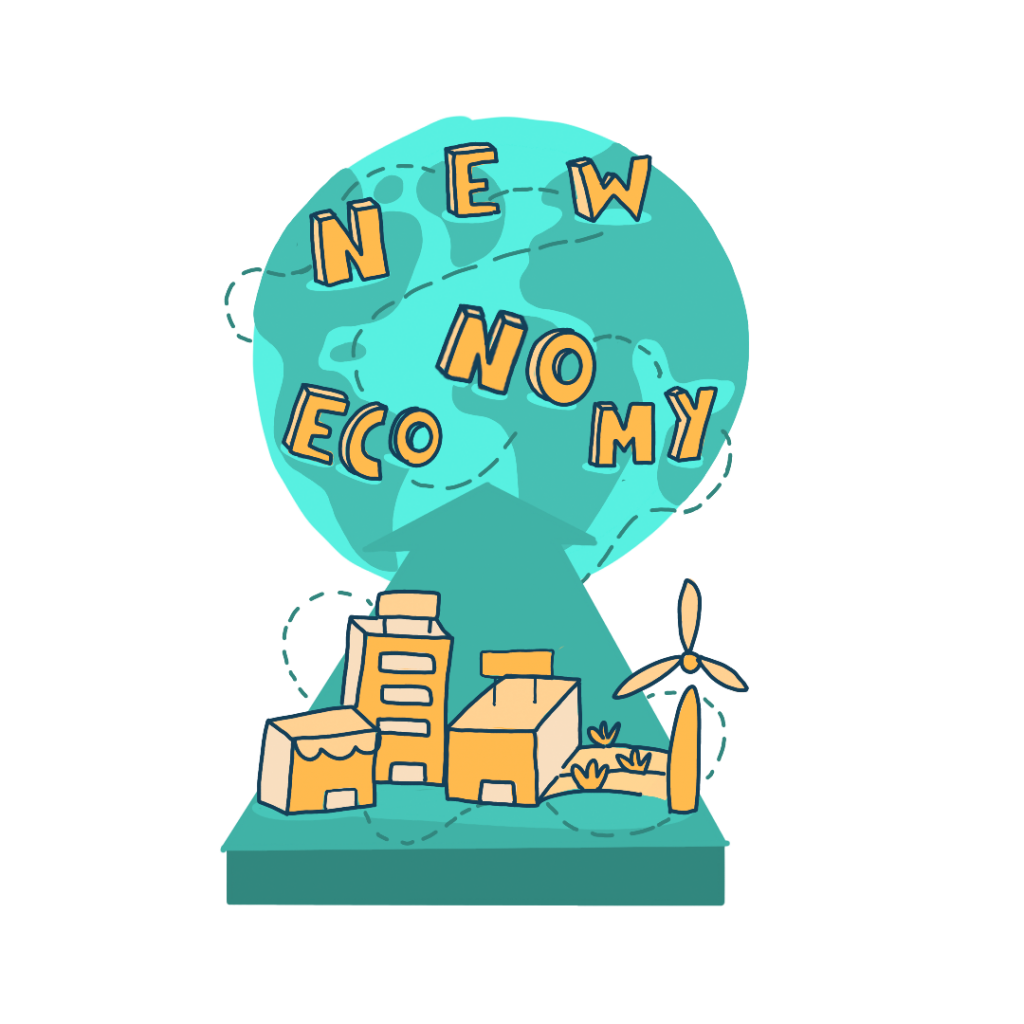
In our new economy we need fundamentally different businesses and companies, both in terms of purpose and organisation – businesses that are smaller in size and power, that are collectively managed, that are for purpose not profit extraction.
Beyond transnational corporations – smaller companies: Transnational corporations (TNCs) are responsible for considerable social and environmental impacts, have a disproportionate and illegitimate influence over policy making and politics, and hold a dominating position on markets, preventing other businesses from emerging. Ultimately, the power of TNCs should be dismantled and the majority broken up into smaller, independent, more localised companies.
Purpose-driven businesses: work should be oriented towards the production and provision of products and services to cater for the fundamental needs of individuals and society within planetary limits. This means polluting and superfluous activities should be discontinued (fossil fuels industry, much advertising, large agri-business, etc.). Endless production and accumulation of profits should no longer be objectives. High returns on investments and dividends for shareholders most of the time are normally the result of a decrease in wellbeing of workers and communities, and depletion of resources or degradation of the environment. Businesses should no longer seek to pay dividends or make profit beyond an operating profit for re-investment, but primarily have a social purpose, whilst seeking financial stability (including that the owners and workers get a decent income). Social enterprises are one example.
Strong regulations on any business or company: a general rule of thumb should be that production and consumption is carried out in a way that causes the least damage and this is strictly regulated through political and legal frameworks for businesses that ensure implementation of human and workers’ rights and internalise full social and ecological costs. New laws must include civil, administrative and criminal liability and allow victims to go to court in the home country of a company in case of environmental and human rights violations.
Idea 6: Trade, solidarity and international relations
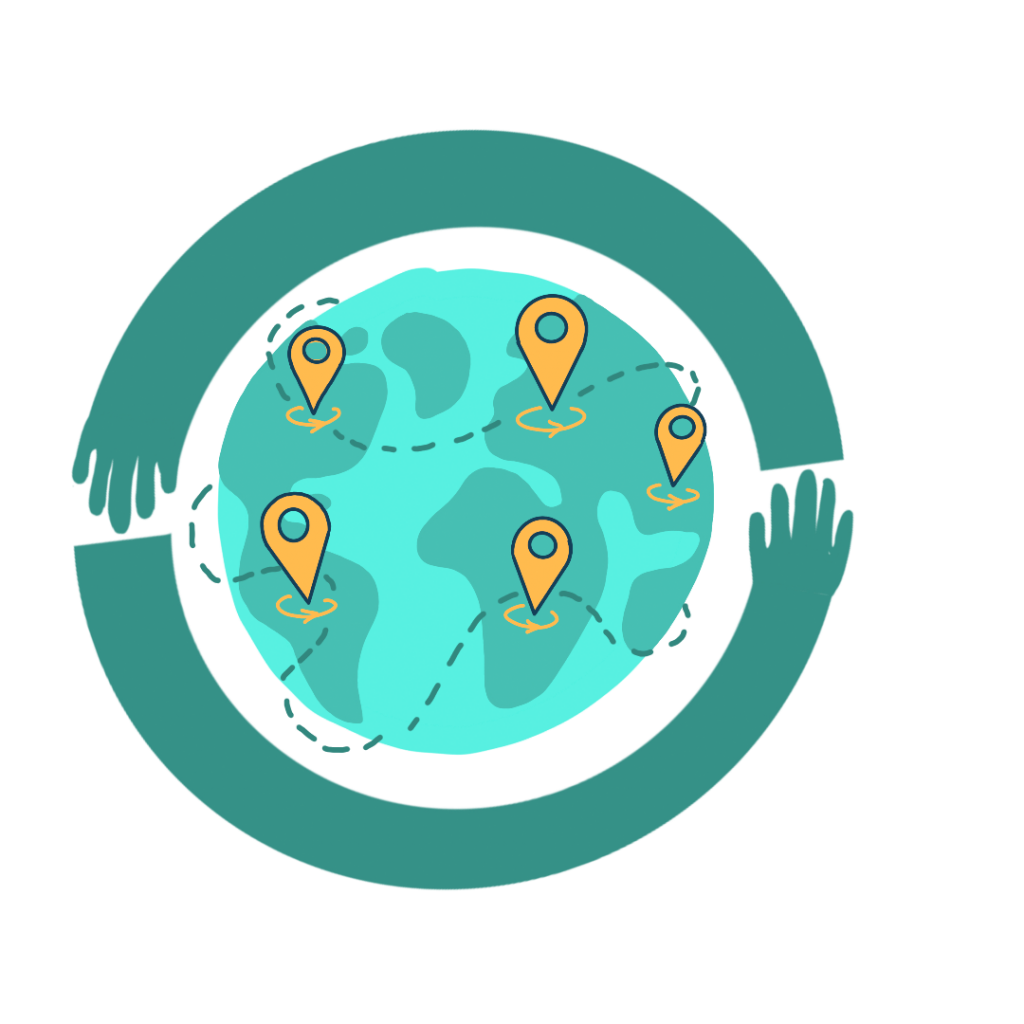
In a new economy, Europe needs to become a truly fair global economic player – to stop its unfair trade relations and move towards less and more localised trade, and to end financial debt towards Global South countries.
System change in Europe to achieve genuine international solidarity: European economies were built in great part through the colonisation of the Global South, extracting and depleting resources and appropriating human bodies and labour. This situation still exists today through neocolonialism. A downsizing of rich countries’, including most of Europe’s, economies and an overhaul of economic, trade and financial rules, are the main shifts needed for the emergence of fairer international relations.
Fair, sustainable and democratic trade: EU trade and investment agreements must contribute to an economic agenda that is fair, sustainable and democratic. Achieving a progressive economic agenda requires a radical break with the foundations of current trade policy. Trade and investment should not primarily serve economic interests, they must be a means to serve the public interest. International trade agreements should not focus on maximising and liberalising trade and investment by reducing the transaction costs for corporate industry, they should focus on how trade and investment can contribute to a healthy environment, decent work, a sustainable and just economy as well as food and energy security within Europe and beyond.
Human-scale trade – a local economy tailored to satisfy the basic needs of all: the largest European economies set up unfair trade rules to govern relations with the Global South and the poorest European countries, with much power held by big Global North corporations to help channel resources. We need to reverse the immoral logic of current economic and trade regimes which obstruct the movement of people, ideas and knowledge, while fostering the unlimited movement of goods and finance. Localisation is a coherent and sound re-organisation of economic activities and trade so that each type of economic activity is allocated to the most appropriate level. Globalised trade flows need to be dramatically decreased. This by no means the end of trade: the volume of international trade should decline, but national, regional and local resilient trade will flourish, embedded in community needs, planetary limits and geared toward social justice. Territories need to de-specialise and diversify their economies so as not to rely on a limited number of items or services to export.
Debt cancellation and unconditional and zero-interest loans: financial debt is another tool of economic domination. For example, conditional credits used to impose economic adjustments on debtor countries, who are constrained to implement deregulation, austerity, and privatisation in exchange of the loans, trapping the poorest countries in a spiral of poverty and inequalities. The Global South’s debt should not be repaid. New, alternative domestic institutions should be set up that provide loans without interest, in local currencies (not inappropriate hard currencies), and without conditions other than respecting social wellbeing and environmental limits. In the long term, all countries should have robust, self-sustainable budgets, in a way that they will not need financing nor bailouts from the outside.#
Idea 7: Values we want in a new economy and society
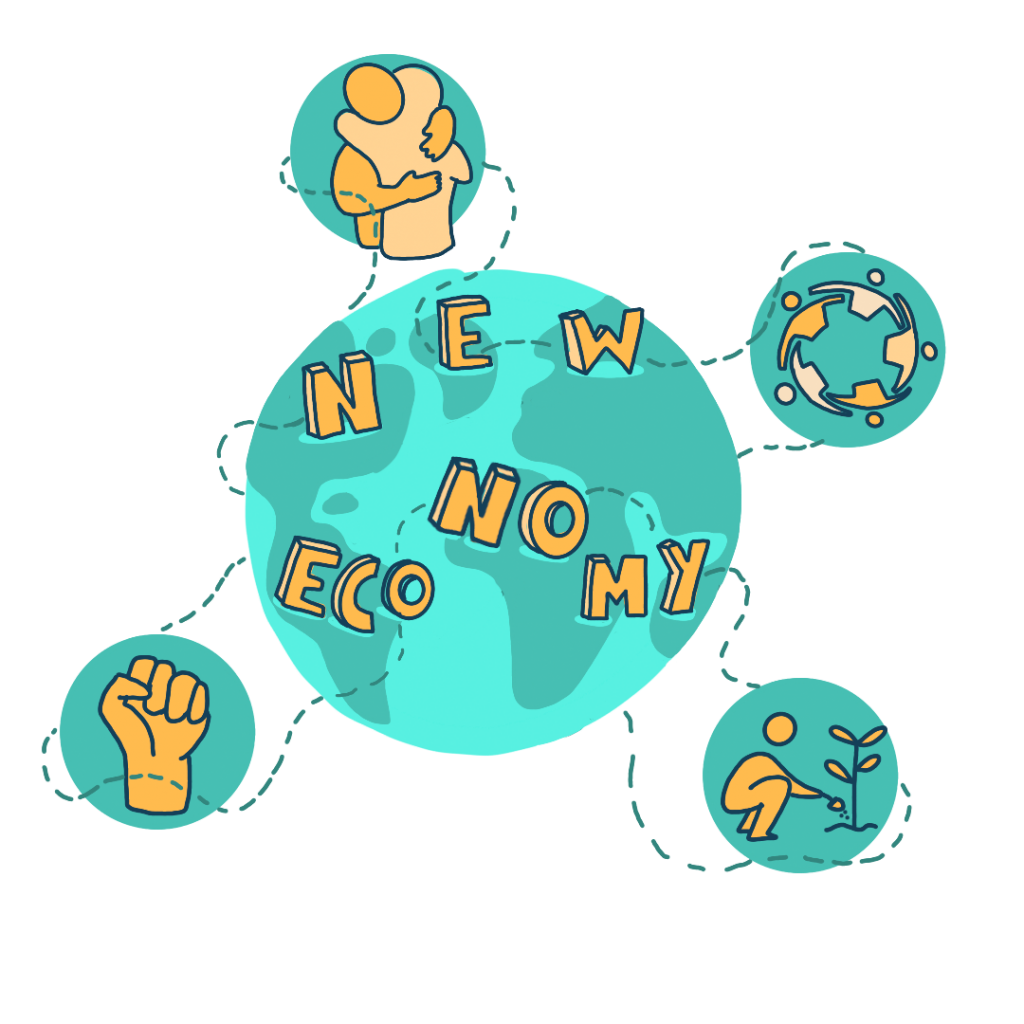
Our vision is of a life-sustaining and thriving economy which embodies and enacts the core values of sufficiency, care and empathy, equality and inclusiveness, and autonomy.
These are the values that we believe are foundational for the economy we want, where people thrive within the limits of the planet. Each value is interdependent – we must embrace them together:
- Sufficiency – the satisfaction of human needs within and across generations so that everyone today and tomorrow has enough, and that no one has too much in regards to fair share and planetary boundaries.
- Care and empathy – people are at their root non-exploitative and non-violent, and empathise with the problems, fears and concerns of fellow humans, non-humans and the planet. Yet these values are suppressed in rich societies, including most of Europe, where the dominant economic system and culture promote individualism. Collective social progress depends on strengthening care and empathy between people, and with future generations, other species and the Earth.
- Equality and inclusiveness – diversity should be normalised. We are all human and deserve to be treated equally, have the same rights and opportunities no matter what our gender, origin, religion or other characteristic. We need to make visible any hidden power disparities and be honest about the specific needs and experiences of particular groups.
- Autonomy – when an individual or society can take decisions critically and deliberately without dominating influences from the outside (not to be confused with individualism). Freedom is autonomy put in practice. Growth and capitalism permanently work against peoples’ individual and collective autonomy by undermining their livelihoods, democratic debate, by positing ‘natural economic laws’ that are not up for debate, etc. Societies will be autonomous when their rules are set through democratic deliberation among autonomous individuals.




